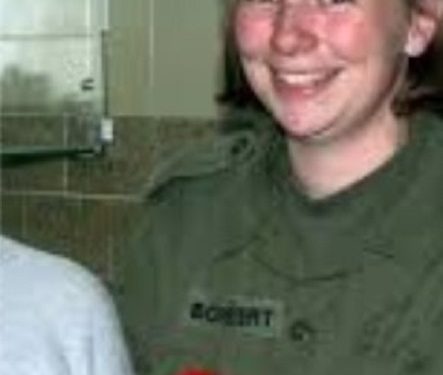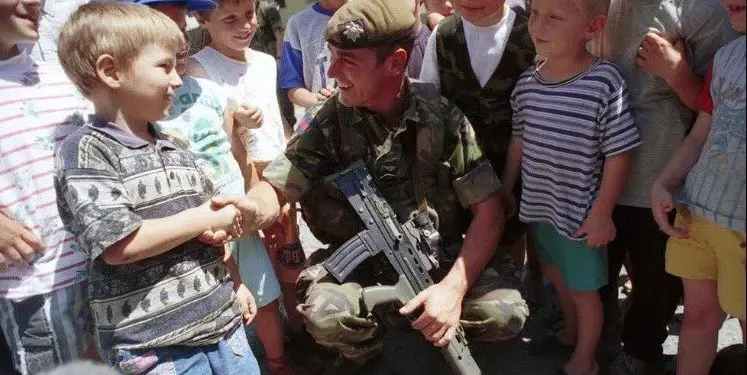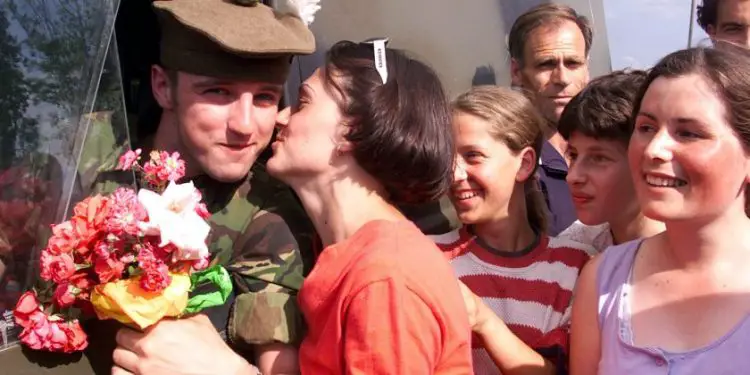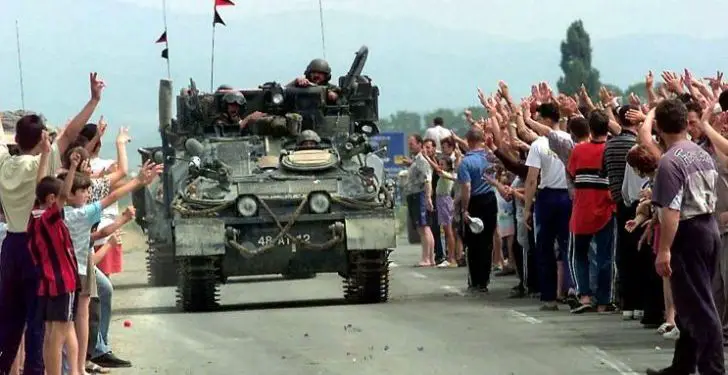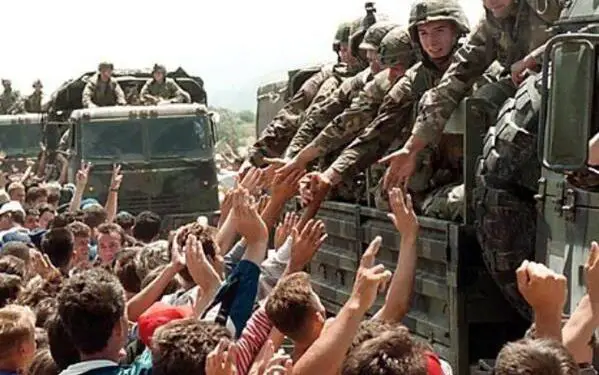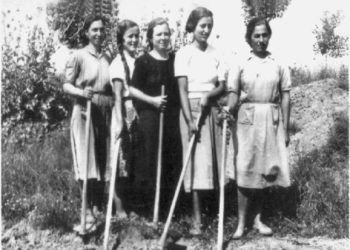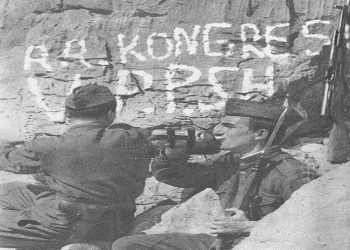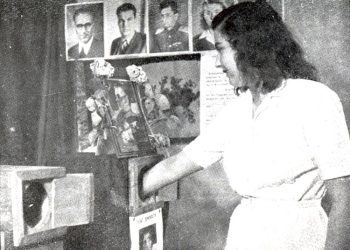Memorie.al / Sophie Boisvert Levesque were a Canadian soldier who served in Kosovo during the last war. However, for her, Kosovo became much more than a war zone, and the Kosovars were much more than refugees and the persecuted. She tells in detail about her experiences during and after the end of her mission in Kosovo and how the Kosovar children changed her life forever…! Below is her full testimony.
Sophie Boisvert Levesque’s Testimony:
I joined the Canadian Army in 1990 when I was 18 years old, with the expectation that one day I would be sent somewhere in the world to help. I chose to start a family at an early age; I had my daughter when I was 20 and my first son when I was 23.
Therefore, I did not have the opportunity to serve anywhere before I joined the “408 Tactical Helicopter Squadron in Edmonton,” Alberta, Canada.
At the beginning of 1999, we were told to get ready because we would be deployed to Kosovo. My cousin came to take care of my children, and at that time, I spoke with the Major to ensure I would go. This was my dream, and with the news coming from Kosovo, I knew it was time to help.
We were supposed to leave at the end of June 1999, but due to the elections in Greece (that is where we would pick up our truck and other equipment), we were forced to leave earlier. We finally left Greece on June 8th.
At that time, everything for me was action, excitement, and adventure. When you come from a peaceful country and have never had the chance to look war in the eye, it seems like something new.
When we arrived in Greece, they wanted us to leave from day one. They did not want us there during the elections, so we unloaded the equipment and waited for the ships to arrive with our trucks.
As soon as we got everything, we were stationed in Macedonia. As we were leaving Greece, there was graffiti everywhere, with slogans that read: “Go back home, murderers,” “May you return in coffins.”
We stayed in Macedonia for a few weeks before being deployed to Kosovo. I don’t remember the exact date, but I will never forget what I saw that day. Seeing the refugees and the destruction on the news is bad, but seeing it with your own eyes is terrible. We were divided into groups.
Flying over all that destruction was heartbreaking. Men, women, and children moving through the refugee camps. Small white tents, mass graves, burned houses…! More than a horror…! For me as a Canadian, it was forever etched in my heart. And this was just the first day.
We were stationed in Kosovo, near Gllogoc (now Drenas), in a 1 square kilometer camp, which would become our home for the next five months during our service there. As soon as we landed, children approached the wires and asked us for food. One of us had candies and chocolates and gave them to them.
One of the children asked me why I wasn’t smiling. My answer was short and simple: “Give me some time until I digest this entire situation.” The mother’s instinct within me was deeply hurt. That world, my future, was changing.
In the following days, two military police officers came to our home, which we had created far from our real home, and were looking for a female leader to deal with the refugee children, and they asked me if I wanted to be their leader.
Since I love children, I loved them even then, and I wanted to do something good, I accepted immediately. My army boss gave me permission to go with them once a week.
The first day I visited the children was a bit strange. Strange because they had big, sad eyes and did not know what to expect, yet they were ready.
We photographed all the children, and in the pictures, they looked like prisoners of war. No smiles, straight faces, and very insecure. Whereas, for me, it was the beginning of an eternal love story.
Those 21 children became mine. They were innocent and intelligent. I had never been trained before and didn’t know much about the activities I should do with children, but we did various things. One day I told the children to draw what they wanted to be when they grew up.
In Canada, this was a common question. When you asked Canadian children, they wanted to be police officers, firefighters, and teachers. But from my Kosovar children, I got a sad look. Two of them gave me an answer, while the others did not know.
I came to the conclusion that; when you don’t know if you will be there tomorrow, if you will have anything to eat, when your house has no roof, what you will do in 20 years is completely irrelevant.
Every week they would give me flowers and cookies. Every time I held the flowers, I got a feeling of relief, because for another day, my children had been saved from the mines, and I would have more time to love them.
I was amazed by the fact how little those children had and how much they wanted to share things with me. I couldn’t take the flowers with me, but I never threw them away or ate the chocolates and other gifts I received. In fact, I still keep them. If I didn’t keep them, it would feel like I was destroying the connection with the children.
Two of my girls came to me one day with two dolls. They wanted to give them to my daughter. Through the translator, I told them that my daughter most likely had more dolls, so it would be better if they kept them.
I will never forget their answer. They were giving me those dolls to thank my daughter for sharing her mother with them for six months.
My days became happier when we were able to see the lights returning to the surrounding villages. Seeing that their lives were returning to reality was a comfort to me and many other people.
The children were finally smiling again. I remember that we were not allowed to give medicine or anything else to the people around us, but we did it.
One of my children once came to the tent and asked for me. His mother had a strong toothache and could not go to the dentist. I met our dentist and told him the truth that I needed help, but the medicine was not for me, and he still helped me. It was a lie, but we couldn’t stand by and do nothing.
Then, one of my girls had warts on her hands. I had one, so I had the opportunity to get medicine. I gave it to her. Our translator helped me explain to her how to use it. We told her to use it every day after showering.
For us, a shower a day was normal. She looked at me and told me that she could not take a shower every day, so we told her to wash her hands carefully every day and then use the medicine we gave her.
We were two completely separate worlds, because we never had to survive a war. I missed my children very much, but I knew that by helping the Kosovar children, the separation was also worthwhile.
The last meeting was very difficult. We were lined up to say goodbye and shook hands. I was the only woman and was at the end of the line.
The children started crying in front of me and I took them in my arms. This was slowing down the process, but I was so hurt that I had no other choice but to say goodbye in that way.
The hell began when I returned home. I did not know how to be a mother to my own children and I was afraid for those I left behind. For me, the war did not end because I was home, and I was afraid that they were hurt, or in the worst case, my children were killed.
Before leaving, I gave my address to all the children so they could write. I was in a very dark period of my life when I received a letter from my little Labinot.
I never answered his letter and I regret this. All contact was cut off for the next 19 years. I wanted to know, but I was too afraid of the answer I might get. That’s how I developed a post-traumatic stress disorder, and I was never able to be the same with my children and my family again.
Every day, every week, without telling my family, I was thinking about my 21 children, my children from Kosovo. It took me a long time to gather the courage to do something. I was a proud and strong warrior there, but I returned, becoming a powerless and sad person.
On June 8, 2018, I told myself enough! I posted on a group I had joined a few weeks earlier, “Young People of Kosovo,” and asked for their help to find the children. I feel like the whole country helped me, everyone was willing.
A police officer had gone door to door in Drenas to find information. Some called me, others wrote to me, but it only took 72 hours to find them all alive and well.
Kosovo is like my second home. I have contacted my children online, but I want to hold them in my arms again and never let them go again.
I feel like I gave them up for adoption and have now found them years later. I know they had parents, family, and love, but the fact that I didn’t know what had happened to them had left an unhealed wound in me…!
My biological children have to forgive me. I was not a good mother to them because of what was happening in my head and heart. But now I am complete again. I have my family here and my family there. I am leaving home again to return to my second home, in Kosovo.
Many Kosovars thank me for my contribution and treat me like a heroine, but the real heroes are you. You experienced and survived a terrible war. The best thanks for us is to see you progress in life. I am proud of all of you. Memorie.al




